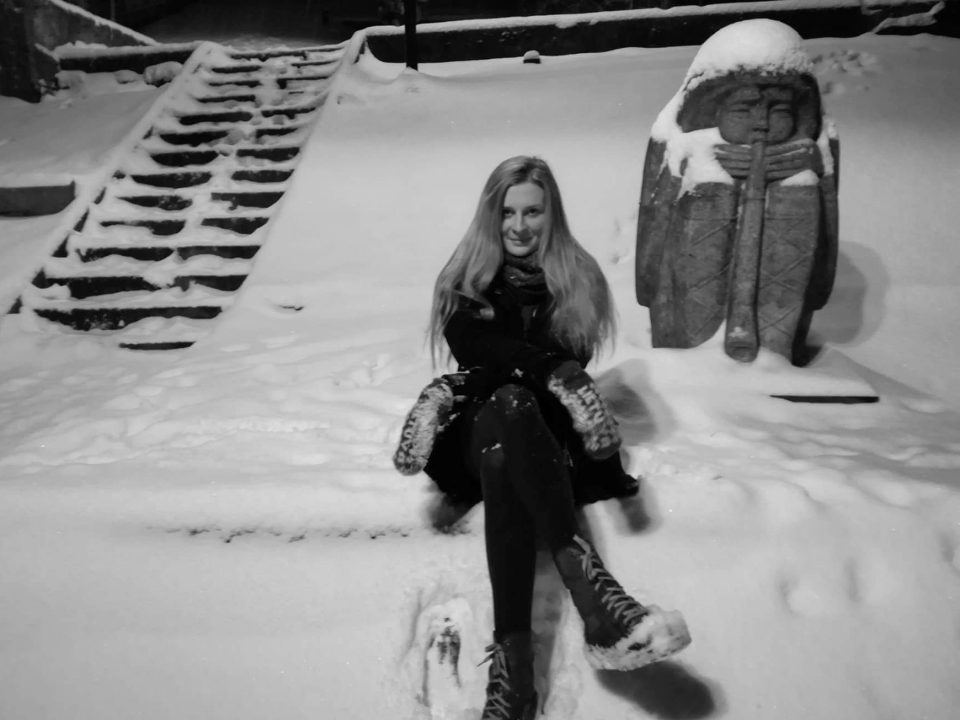Daiva IVANAUSKAITĖ

Dalia BIELIŪNAITĖ
2020-09-29
Prof. Tessa Rajak
2022-11-16
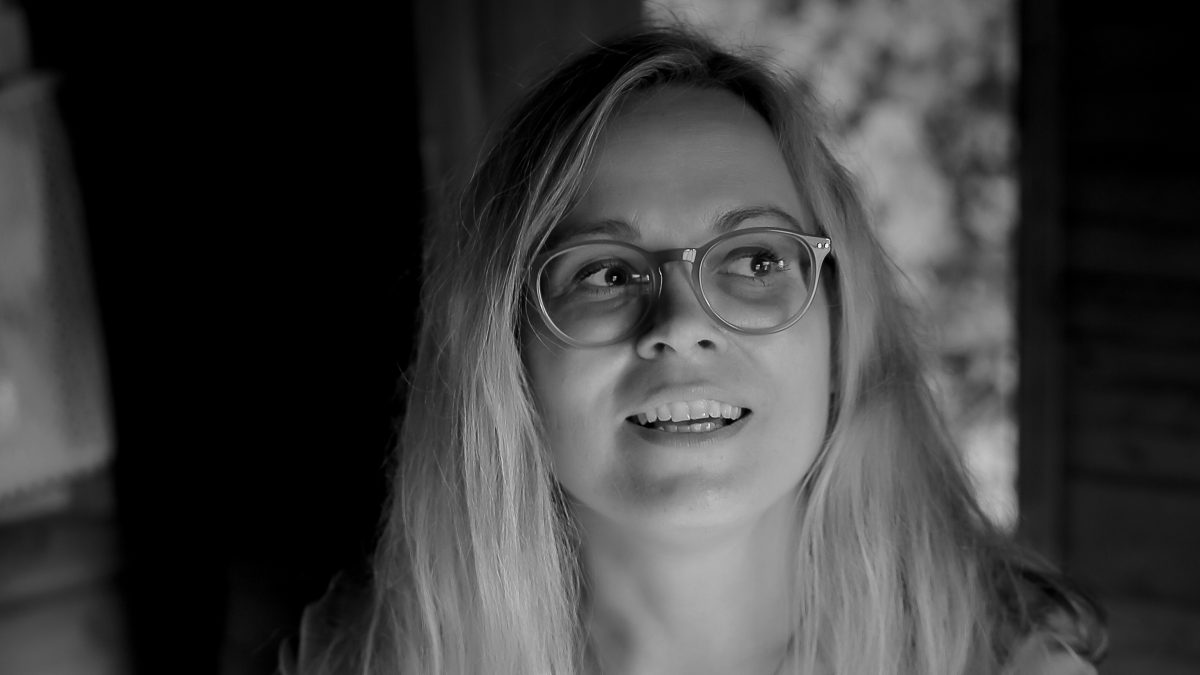
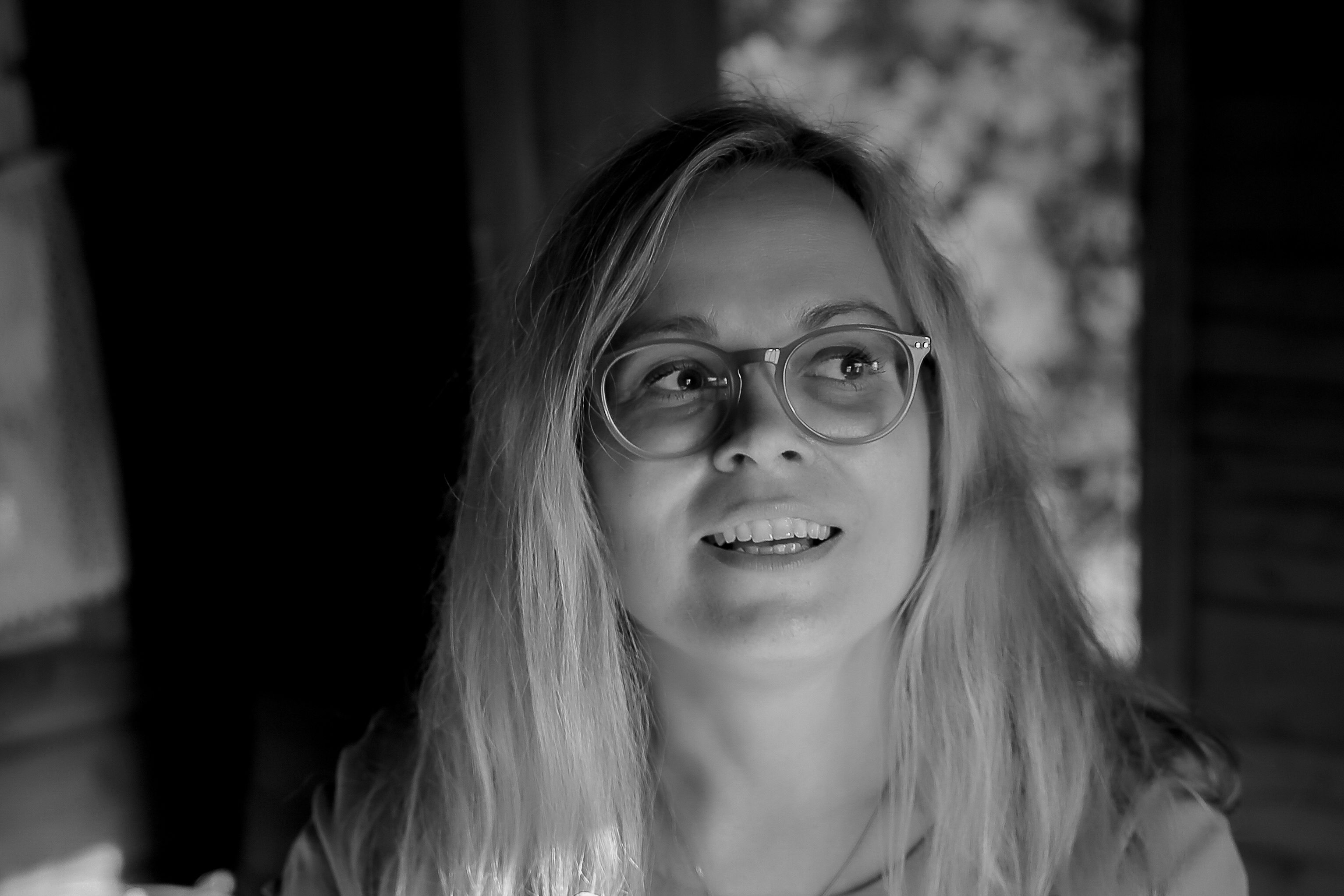
Photo by Kristina Meilutė
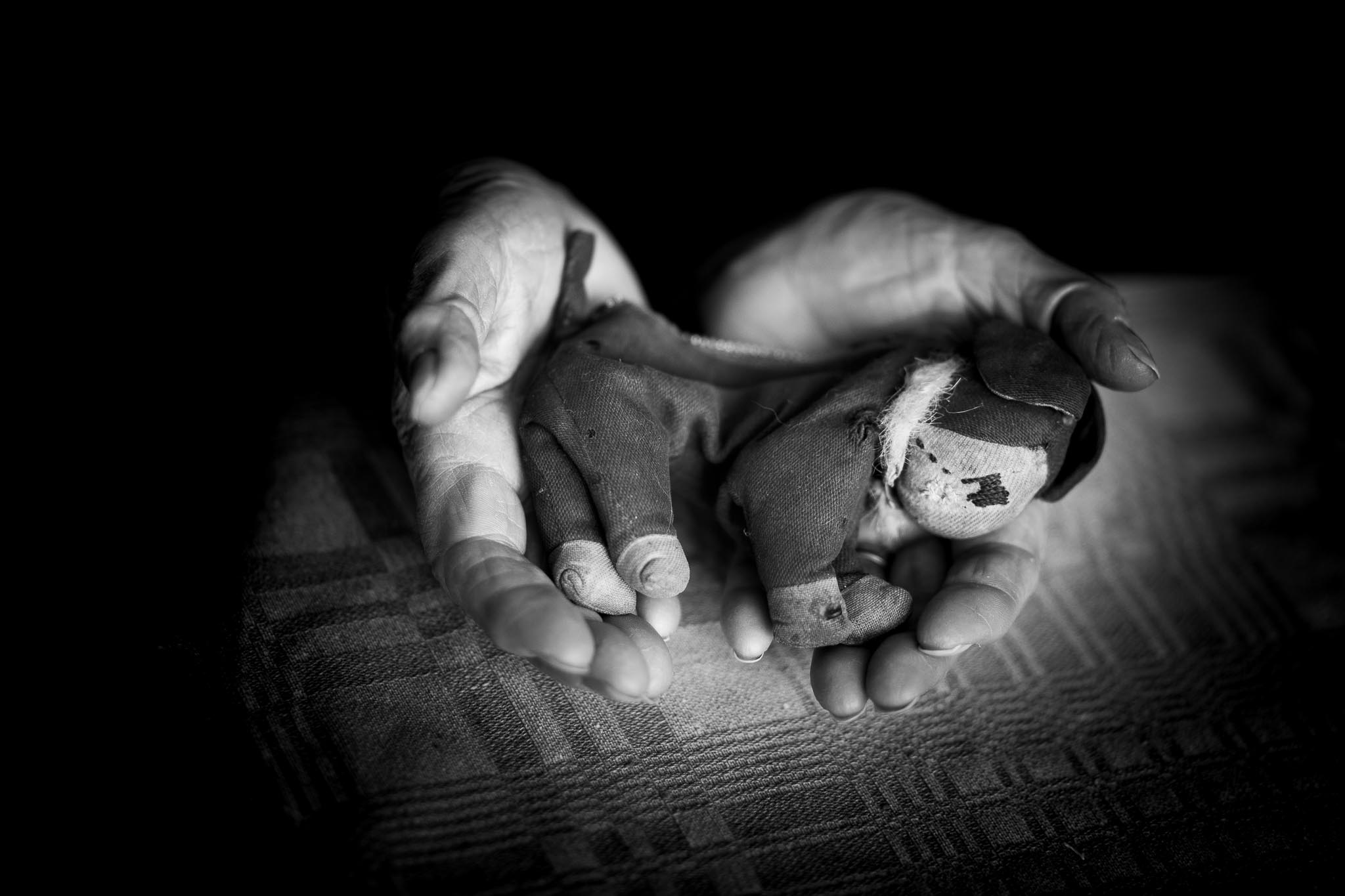
Photo by Kristina Meilutė
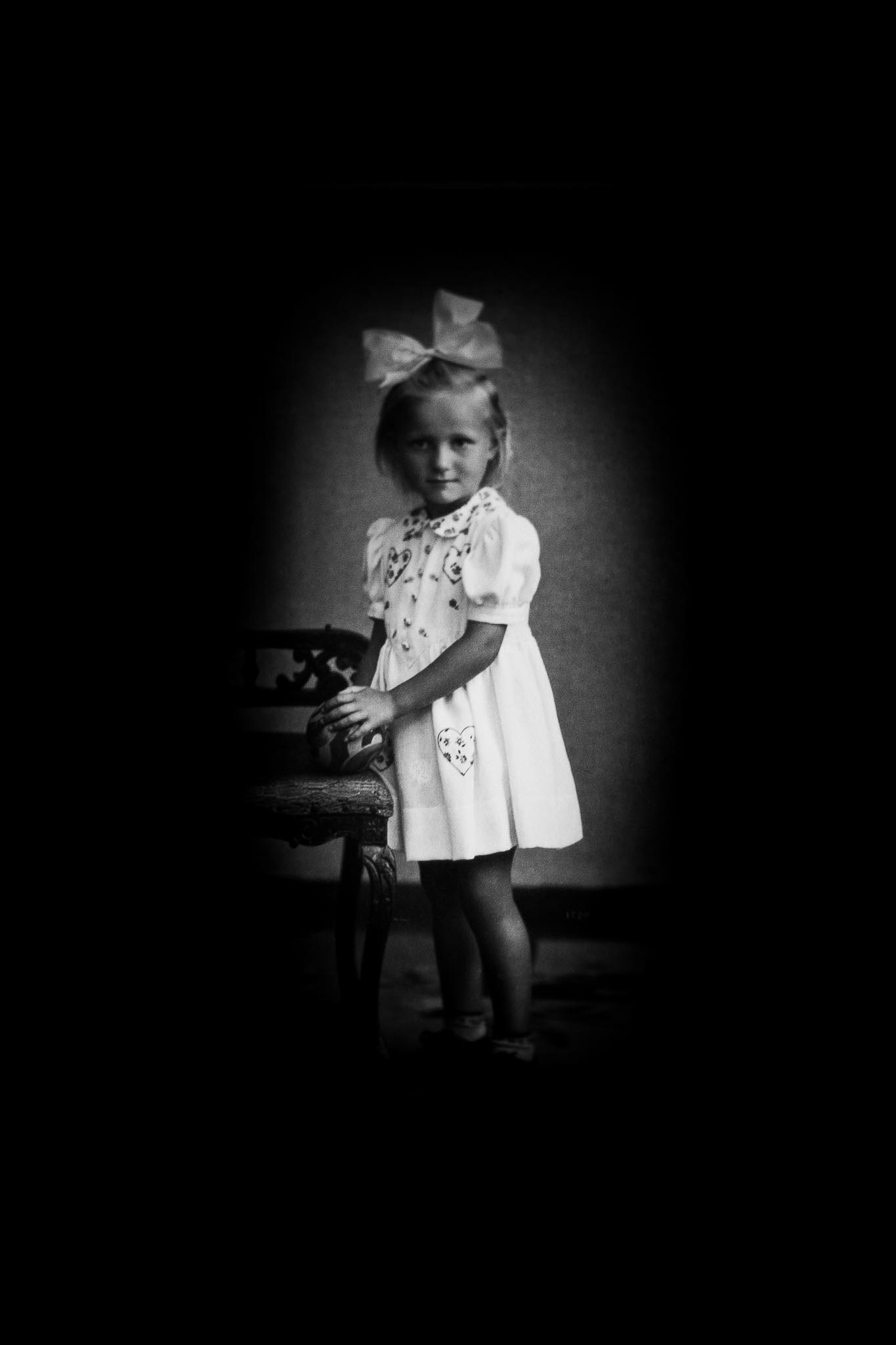
Personal archive of Ingrid Ramm
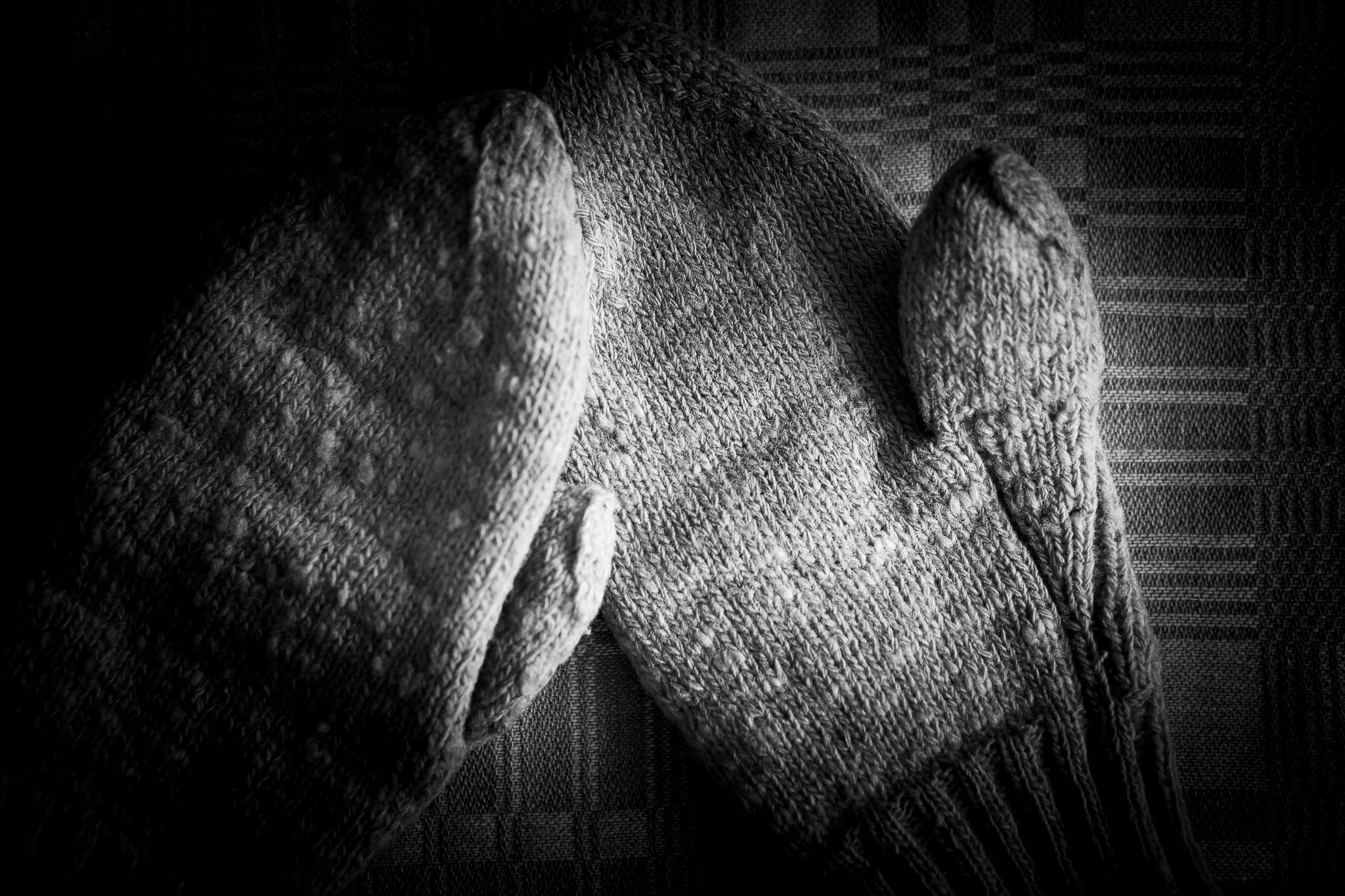
Photo by Kristina Meilutė
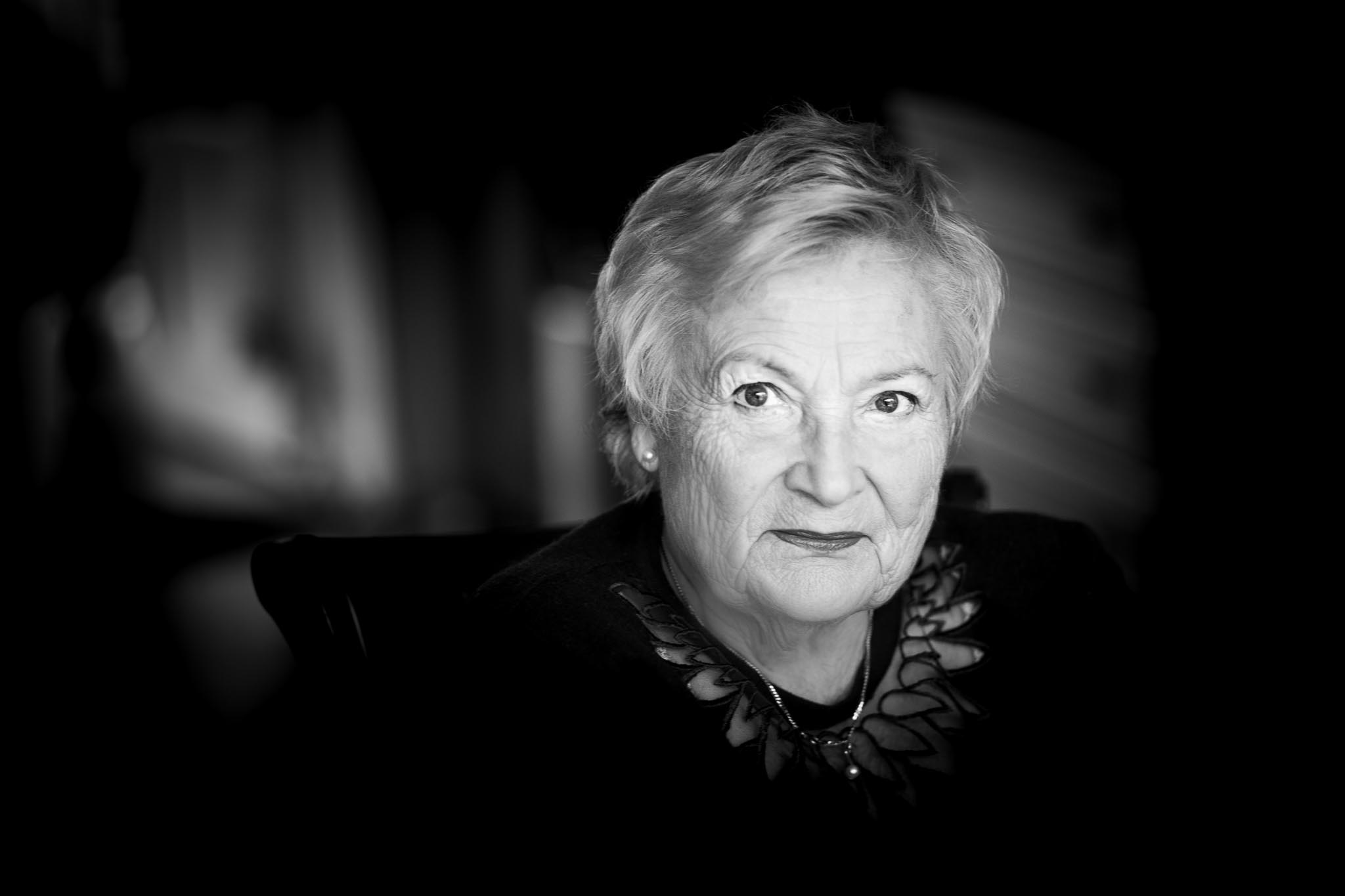
Photo by Kristina Meilutė
Daiva IVANAUSKAITĖ
Wolf girl
Translated by Kristina Aurylaitė
When I was a child, aunty Inga, as I used to call her, told me an incredible story about how she, then a little girl herself, had gotten on a train in Königsberg and arrived in Kaunas, all alone, in search for food.
After World War II, many German children of East Prussia fled to Lithuania to escape starvation. They are called “wolf children.”
Aunty Inga is one of them.
The war and the subsequent treatment of the Germans in East Prussia by the Soviets eradicated Ingrid’s family. In 1947, orphaned, she set out for Lithuania. Ingrid was eleven.
When I was a child, this was as much as she was ready to tell me. And I wasn’t ready to know more.
But now that I am a grown woman, and aunty Inga is graduating from the university of life, as she jokingly puts it, we are both ready.
I am sitting in her kitchen, my voice recorder set on the table. I am munching on hot sandwiches, waiting for her to begin.
Before she does, I conjure up a fantastic plot about a pack of wolves living in a forest which is about to disappear because of continuous logging. After the hungered wolves start attacking the cattle, the local farmers decide to exterminate them. Among the whizzing bullets and falling bodies of the wolves, a miracle happens – a mother wolf transforms her pup into a human being, a little girl, who manages to escape. Growing up, the girl keeps trying to understand who she is, a wolf or a human.
The narration below is but a tiny piece of Ingrid Ramm’s incredible story.
On a train to Lithuania
Ingrid was a little girl, and the door to the car of the freight train was high up. She found it impossible to get in, but then, suddenly, a Russian soldier grabbed Ingrid by the scruff of her neck, lifted her, and threw her in like a log. She scrambled up off the floor, scurried into a corner of the train car, and settled there. The train began to move. The Russian soldier slammed the door shut.
Seated on one side of the car were German women with children, on the other side – a bunch of Russian soldiers. They were very young, teenagers, really. They were drinking vodka and spitting shells of sunflower seeds. Not a single German woman or child would engage Ingrid in a talk. She sat in her corner, hunched over and silent.
The train was slow and kept stopping on the way, waiting. It would move for some time, then slow down and halt to a stop. And those soldiers kept on drinking, and they kept on spitting. Ingrid dozed off. Her winter hat with large ear-flaps, earned while looking after the children of the Russian officers’ wives, slipped down to cover her face.
Suddenly, some horrible noises woke her up. The women were shrieking, the children squealing. Ingrid raised her head cautiously: the drunk Russians had lost control, opened the car door of the moving train and were throwing the women and children out. Every single one of them.
Ingrid pulled her hat over her face and tried to drown in the shadows, muttering “Vater unser,” the Lord’s Prayer, under her nose. She kept saying the prayer over and over again, without even a brief pause after yet another “amen” …
Exhausted, Ingrid dozed off again. When she woke up, the train car was empty, not a single German woman, child, or a Russian soldier in sight. Only the door of the car was wide open. It was freezing. The train kept moving; Ingrid could see trees flying by, covered in hoar frost.
Finally, the train stopped, and Ingrid found herself in Kaunas.
Father’s gun
In a suburb of Königsberg, in close proximity to the airport, there was a township called Neuhausen. One of its narrow streets housed five buildings, each of which accommodated two families. The Ramm family lived in one of them. Ingrid was the youngest of the five siblings and the only girl. When the Eastern Front opened, she was only five.
Ingrid’s father was a pilot and the head of the fire department at the military airport. He would rarely go to the front, only to inspect, but in the summer of 1944, he left for a long time. The autumn ended, and the winter began.
It was snowing heavily that day. Her ear glued to the radio, Ingrid was listening to her favourite aria and trying to catch every note. She no longer had to fight off her brothers. She no longer had to hug the radio tightly, protecting the handle so that they wouldn’t switch to another wavelength in search for popular songs.
Suddenly, Ingrid’s dad burst through the front door. He was beside himself; his eyes were glowing with frenzy. “Albrecht, wo ist Albrecht?” he shouted. “Albrecht, where is Albrecht?”
Albrecht was the youngest of Ingrid’s four brothers, then a teenager. He wasn’t home. Ingrid’s dad continued: “The Russians are at the door. I’ve come to say goodbye.”
Ingrid stared at her father. He was no longer a pilot, but a tankman.
“Don’t let the Russians get hold of you alive!” He repeated this several times.
“Friedrich, so what should we do?” Ingrid’s mother asked.
Ingrid’s dad hugged her mom with one hand, then pulled Ingrid with the other and held them tight. After a while, he released them.
“Friedrich, so what should we do?” Ingrid’s mother repeated.
He was on his way out, but turned and shouted: “Hang yourselves!”
The door slammed shut behind him.
Then it suddenly opened again, and Ingrid’s dad rushed inside. “No, don’t hang yourselves!” he shouted. Then he took out his pistol, loaded it with bullets, and put on the table. Then he ordered:
“When Albrecht comes back, he must shoot Ingrid first, then you, and then himself. Don’t surrender to the Russians alive!”
And then he left. That was the last time Ingrid ever saw him.
Her mother took the gun and hid it in the pocket so that, if need be, she could carry out her husband’s command herself.
The residents of the township spent the night in a bunker because the airport was heavily mined, and buildings could start falling apart because of air pressure.
Albrecht, Ingrid, and their mother hid in the bunker, too. Ingrid’s other brothers were already gone.
That night, big battles were fought. People in the bunker could hear explosions and shots fired; the earth itself seemed to be rolling and quaking. In the morning, the door of the bunker was flung open. It was the Russians. They ordered people around, searched through their personal possessions, looked for soldiers and weapons. And Ingrid’s mother had her husband’s gun! She kept it under her arm, tucked under her wide winter coat, and now started stamping her feet, impatiently. She told her children to wait for her and rushed towards a Russian soldier to let her outside, claiming she badly needed to use the toilet. He took her outside.
The land was covered with fresh snow. Ingrid’s mother squatted, her coat covered her like a tent – she only had to lift her arm and the gun fell into the deep snow.
Who wants some hot kugel?
After the train stopped in Kaunas, Ingrid scrambled out of the train car. Her hands shone like diamonds – they were white and covered with hoar frost like the trees along the railroad. She didn’t have any gloves or mittens.
Ingrid scurried across the railroad, turned into a street and found herself near a marketplace. Her stomach growled.
Then some woman caught Ingrid’s attention. The woman was standing on the sidewalk near the market, a basket – kašiukas – on her bent arm, covered with a white sheet. The woman kept shouting: “Kugel, kugel, who wants some hot kugel? Kugel, kugel, who wants some hot kugel?”
These were the first Lithuanian words Ingrid heard. The sound was amusing, something like, “Pla-pla-pla, pla-pla-pla? Pla pla-pla, pla-pla-pla?”
Ingrid got curious – what’s there in that kašiukas? What do these funny words mean?
She noticed an elegant man in a beautiful coat; he looked so pre-war. He handed the woman five červonsai – five ten-ruble notes in all – and got something in exchange, something wrapped in a napkin. That something was dripping with fat.
Ingrid remembered – she also had five červonsai! She had five červonsai! She found her purse, pulled it out with her frozen fingers.
The purse was shaped like a dog, her dad’s gift! Ingrid unzipped it, took out the money, shoved it to the woman, and got a piece of kugel! Oh, how warm it was, how soft, how well it smelled… and that greasy paper was so tasty to suck on! It’s impossible to describe how scrumptious that kugel was.
In Žaliakalnis
Ingrid sat near the steps of Žaliakalnis funicular. She was barely alive; her hands were frost-bitten and her belly bloated with hunger. Some old woman noticed her and took her to her place on the hill. Ingrid fell ill with heavy pneumonia and stayed in bed until spring. After she got better, the old woman moved her to a tiny shed to sleep on the hay with a goat. She told Ingrid to look after that goat and would also send her into town to beg. And she would hardly ever feed Ingrid.
Exhausted after a long day, Ingrid would fall onto the hay in the shed, but she couldn’t sleep – she had to keep fighting off rats, crawling onto her body. And she would weep, wiping her tears with her purse shaped like a dog. She would tell the dog all her pain and sorrow. That purse never had enough time to dry.
During those nights in the shed, Ingrid would think about her mom and dad, and home. She remembered how strict her parents were, how they taught her table manners, taught her to be delicate with food and to use the utensils properly. She had to hold her arms pressed to her sides, and they would put expensive saucers under her arms. If she were to relax the muscles, the saucers would fall.
She remembered delicious fried potatoes with the sauce. If she failed to eat them in an elegant way, using knife and fork, she had to leave them for her brothers. They would get to finish off the potatoes, and Ingrid had to watch.
She remembered their house, devastated after the Russian siege: the door kicked out, the dishes smashed, the radio broken. Memories kept flashing in her mind, of days in Königsberg, all in ruins after the bombings, of nights in the cellar of their demolished house.
She would remember her mother’s songs.
Ingrid’s mother died of hunger. She had felt she was going to die. She had repeatedly instructed her daughter, “Ingrid, find me a coffin, any kind of a box. I don’t want to be shoved into the ground just like that.”
But it’s one thing to find some planks to light a fire and a very different thing to find a coffin. Where was a nine-year-old girl supposed to get it?
Frau Ramm’s body was wrapped into a blanket – adijalas – and laid out for the wake on a bench, placed in a wide corridor between two flights of stairs. Ingrid spent three nights near her mother’s dead body. During those nights, she sang of all the songs her mother had ever sung to her.
Ingrid would also often remember a little knife, pressed into her wrist. An image would flash, of her mother, trying to pluck her courage to cut her daughter’s veins, because life had become unbearable.
Next time her mother took her to the bridge. It was the end of winter, ice-floes were floating along the river. Her mother tied a scarf over Ingrid’s eyes. They were supposed to jump off the bridge together. But Ingrid resisted, fiercely…
In that shed in Žaliakalnis, she would also think about her father’s last order – and about the bridge over the river Neris.
Two sisters
Ingrid was feeling quite well, but her hands… They exuded a horrible stench, like rotting meat. The old woman would wrap Ingrid’s hands in dirty rags and send her to beg.
One day Ingrid knocked on the door of a wooden house in Žaliakalnis. No one came to open it, so she decided to have some rest on the front stoop. Sometime later, a woman returned, with a little boy in tow. It was Stonkienė. She invited Ingrid in and offered her some food.
“And what’s with those poor little hands? Let me unwrap the rags and have a look.”
The woman unwrapped the rags only to find an awful stench, the skin peeling and all the nails gone. She rushed to search for some potassium permanganate to clean the wounds. After Ingrid had bathed her hands in the solution, the woman wrapped each of her little fingers with bandages, soaked in pink medicine. Before she let the girl go, she told Ingrid to come visit her every day.
Every day afterwards Stonkienė would prepare the potassium permanganate solution for the girl, and would then bandage each of her fingers anew and feed her. Once she asked Ingrid, “Look, my sister is very busy in the village at this time of the year. Would you mind going there to help her? You could spend a couple of weeks with her until she is done with digging her potatoes?”
That is how Ingrid found herself in Tursučiai, a village near Marijampolė. She soon gained the trust of the farm landlady Kačergienė, my grandmother. A couple of weeks turned into three years. Ingrid worked diligently, both at home and in the fields, and with the cattle. She looked after Kačergienė’s little children, my mother Birutė and her baby brother Kazimieras. She cooked. Kačergienė also entrusted Ingrid with the finances of her farm. Ingrid knew where the family kept their money and how much there was. When needed, she would give a necessary amount to Kačergis, my grandfather, for him to pay the bills. Ingrid learned Lithuanian quickly and started reading Lithuanian books.
Ingrid was baptized according to the Catholic tradition and given the name Marija. To make it simpler and more Lithuanian, the family called her Marytė.
After the day’s work was over, Ingrid would kneel in the granary and pray – in Lithuanian: “Our father in heaven,” and would finish the prayer, “Lord, bring me back to my homeland.”
In Kaunas again
Social status was very important to my grandmother Kačergienė. She prided herself in being a farmer and in the fact that her father, my great-grandfather, was granted a piece of land for his volunteer service in the Lithuanian army during the independence war against the Poles in the aftermath of World War I.
Kačergienė insisted that her children go to school. Ingrid also wanted to go to school, but at this point my grandmother was of a different opinion. Why would a farm girl need education? After an unpleasant conversation, Ingrid seemed to have woken up. She had to take care of her future, she had to study. She had to go back to Kaunas. Her place was not in the village.
Ingrid wrapped her scanty belongings in a scarf and left for Kaunas on foot. In Kaunas, however, there was nowhere to go. She sat down on a bench near the War Museum – the statue of Liberty hadn’t been demolished yet – and burst into tears and sobs.
Suddenly, a tiny hand placed a small bouquet on her lap. Ingrid raised her teary eyes – staring at her was a boy of around three years of age.
Then a woman came up to her, and they started talking. Ingrid got the address of some people who were looking for a nanny. This is how she started working for the Juškai family, but she also asked them to let her go to an evening school. The Juškai agreed and got her documents sorted out. That’s how Ingrid Ramm became Marija Ramaitė, and later Juškaitė. These wonderful people adopted her. After the adoption, they stopped paying her nanny’s salary.
Ingrid graduated from school. She read most expressively during lessons of the Lithuanian language, helped her classmates do the tasks, write correctly, read, and distribute stresses.
When Ingrid speaks, I hear my grandmother in her, and her speech, colored with the Suduvite dialect, is as neat as an orderly group of soldiers.
Ingrid maintained a close relationship with my grandmother, wrote her letters, and would return to help her in the farm each summer. After the Soviets confiscated the farm, my grandparents spent a year in Kaunas with Ingrid.
It seems to have been Ingrid’s predestination to work with babies and little children. When she was a little girl herself, she looked after their neighbours’ children in Neuhausen and later was a nanny to Russian kids, then to my mother and uncle, and eventually to the Juškai children in Kaunas. Afterwards, she graduated from the nursing school and worked in the children’s home for babies in Vilijampolė.
After Lithuania regained independence, Ingrid went to Cologne to meet with her brother Albrecht’s widow. Having suffered a while in the Russian labour camps, her brother returned to Germany and started a family, but Ingrid never saw him again. He died in a car accident. His widow gave Ingrid the mittens knitted by their mother, which Albrecht had kept all his life.
“How badly I needed those mittens on that train! But my brother needed them more,” sighed Ingrid and urged me, “Eat, eat some more!”
Then she continued, “You know, Daiva, I kept wondering why those Russian soldiers didn’t throw me out of the train. And you know what? I was wearing a Russian hat and Russian boots – čiabatukai. They must have thought I was Russian. That’s why not a single German woman wanted to talk to me.”
I am sitting in Ingrid’s kitchen in Aleksotas. Ingrid’s great-grandchild enters, then five years old. He is curious and listens to our conversation while Ingrid cooks croquets for him.
My thoughts wander back to the fairy tale about the little wolf pup transformed into a girl. The tale, like a golden thread, keeps winding forward and shows the way.
After the wolf girl grows up, the forest grows back, too, and people decide to help it grow even bigger. One day, a wolf appears among the trees. The girl’s heart beats faster. Is it time for her to transform back into a wolf? But is it even possible?
Ingrid still lives in Kaunas.
2020
The story is based on Daiva Ivanauskaitė’s storytelling performance “Wolf Girl,” first performed during CityTelling Festival in 2019, organized by Kaunas 2022.
Daiva Ivanauskaitė has completed a storytelling programme at Scottish Storytelling Centre and is a professional storyteller included in Scotlands‘ storytellers‘ list. She is also an author in Scottish Book Trust list. Daiva’s repertoire consists of Lithuanian, Scottish and world traditional fairy tales, as well as real biographical stories created by her. Daiva tells her stories at international festivals, educational and community art projects, conducts storytelling workshops for cultural and educational organizations.
After World War II, many German children of East Prussia fled to Lithuania to escape starvation. They are called “wolf children.” Aunty Inga is one of them.


